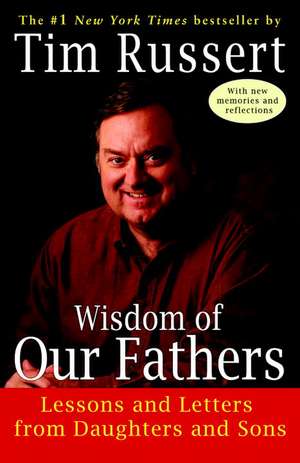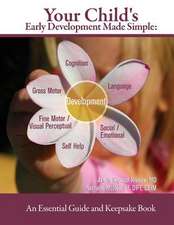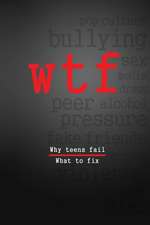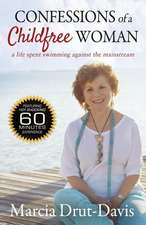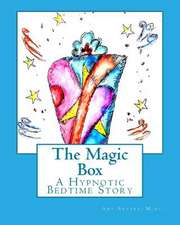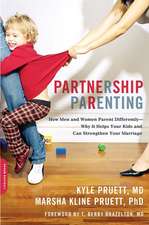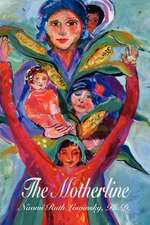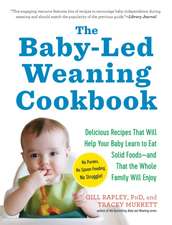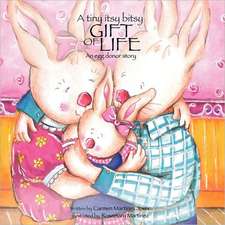Wisdom of Our Fathers: Lessons and Letters from Daughters and Sons
Autor Tim Russerten Limba Engleză Paperback – 30 apr 2007
Vezi toate premiile Carte premiată
Quill Awards (2006)
After the publication of Tim Russert’s number one New York Times bestseller about his father, Big Russ & Me, he received an avalanche of letters from daughters and sons who wanted to tell him about their own fathers, most of whom were not superdads or heroes but ordinary men who were remembered and cherished for some of their best moments–of advice, tenderness, strength, honor, discipline, and occasional eccentricity.
Most of these daughters and sons were eager to express the gratitude they had carried with them through the years. Others wanted to share lessons and memories and, most important, pass them down to their own children.
This book is for all fathers, young or old, who can learn from the men in these pages how to get it right, and to understand that sometimes it is the little gestures that can make the big difference for your child. For some in this book, the appreciation came later than they would have liked. But as Wisdom of Our Fathers reminds us, it is never too late to embrace it.
From the father who coached his daughter in sports (and life), attending every meet, game, performance, and tournament, to the daughter who, after a fifteen-year estrangement, learned to make peace with her difficult father just before he died, to the son who came, at last, to appreciate the silent way his father could show affection, Wisdom of Our Fathers shares rewarding lessons, immeasurable gifts, and lasting values.
Heartfelt, humorous, engaging, irresistibly readable, and bound to bring back memories of unforgettable moments with our own fathers, Tim Russert’s new book is not only a fitting companion to his own marvelous memoir, but also a celebration of the positive qualities passed down from generation to generation.
From the Hardcover edition.
Preț: 111.92 lei
Nou
Puncte Express: 168
Preț estimativ în valută:
21.42€ • 23.28$ • 18.01£
21.42€ • 23.28$ • 18.01£
Carte disponibilă
Livrare economică 01-15 aprilie
Preluare comenzi: 021 569.72.76
Specificații
ISBN-13: 9780812975437
ISBN-10: 081297543X
Pagini: 295
Ilustrații: CHAPTER-OPENING PHOTOS
Dimensiuni: 132 x 205 x 18 mm
Greutate: 0.24 kg
Ediția:Reprint
Editura: Random House Trade
ISBN-10: 081297543X
Pagini: 295
Ilustrații: CHAPTER-OPENING PHOTOS
Dimensiuni: 132 x 205 x 18 mm
Greutate: 0.24 kg
Ediția:Reprint
Editura: Random House Trade
Notă biografică
Tim Russert is the moderator and managing editor of Meet the Press, and the Washington bureau chief of NBC News. He is married to Maureen Orth, and they have one son, Luke.
From the Hardcover edition.
From the Hardcover edition.
Extras
Small
Moments
"In the years when my parents were broke, Dad would give Mom a daisy for each year they were married."
-Donna Pizzolongo, daughter of George E. Raboni Sr.
Small moments? It's often those little gestures-a knowing look, a pat on the back, an unexpected kindness-that make a big impression and shape our favorite memories. When I came home from college to visit, by the time I woke up in the morning Big Russ had already cleaned my car inside and out (windows too) and filled up the gas tank. I once realized too late that I had left behind evidence of a spirited evening the night before, but Dad was nice enough not to mention it.
Dad's small moments weren't limited to me. When one of my sisters had a hard time, especially after breaking up with a boyfriend, Mom would console her, of course, but Dad would be there too, trying to change the subject-often with some good humor. He didn't always know how to comfort his daughters, but he always tried, and they appreciated his efforts.
As a new father, I looked forward to providing some small moments for my son, and I hope there have been many. I have also been on the receiving end of quite a few, and they started very early. When Luke was two, I went to China with the Today Show. My wife, Maureen, flew over to join me for the final week, leaving Luke with her mother and sister in San Francisco. It was difficult for us to be away from him for so long, and on the flight home I actually found myself wondering if our little boy would remember us. When the plane landed in California, we went through customs, picked up our luggage, and looked up to the glass-enclosed balcony where family and friends were waiting to greet the passengers. And there, next to his grandmother, was our little Luke, jumping up and down with excitement. My heart pounded. It was one of the most beautiful sights I have ever seen.
Flash forward about sixteen years. When Luke was graduating from high school, his class asked me to give the commencement address. It was a great honor, but this was the most difficult speech of my life: I had to say something meaningful and inspiring without in any way embarrassing my son. I spoke from the heart and gave the class a kind of blessing: "May you always love your own children as much as your parents love you, as much as Maureen and I love our Luke." I must have passed the test, because when I finished speaking, the class rose to its feet in appreciation-led by Luke.
Then, one by one, the students came up to receive their diplomas. When it was Luke's turn, the headmaster motioned for me to take over for a moment. Neither Luke nor I had been prepared for this possibility, and again I wondered how he would react. To my delight, when I gave him the diploma, I received a rib-crushing bear hug from my six-foot-two baby boy. I actually had to say, "Luke, enough. Put me down!" His classmates laughed. It was funny, but there was more in that embrace than humor.
The graduating seniors received their yearbooks that day, and each student had been given a full page to reflect on his high school career. That night, when I got into bed, I began flipping through Luke's copy. His page began with expressions of gratitude. "Dad," said the first one, "you're the driving force behind it all, and my best friend in the world. Thanks for always having my back. I love you."
Now if you had asked me to identify a specific moment when I had Luke's back, I couldn't point to one. He was reminding me that tender moments are the ultimate wisdom-whether it's the mutual love and respect that two parents share, a supportive word, or one of the many little comments and gestures of daily life that are more powerful than any lecture. Small moments accumulate and last a lifetime and, what's more, they get carried on into the next generation.
I lay back, smiled, and closed my misty eyes. The pillow had never seemed so soft.
THE SOLDIER
A father who wipes away twenty years with a single hug.
One thing I'll never forget about my father-a hard-as-nails tough-love man who fought in two world wars and a war in Africa during the twenties-was the single tear running down his cheek the day he dropped me off at Fort Dix on my way to Vietnam, and the one hug that made up for twenty-two years of no hugging. Only he could understand what the coming year had in store for me. He couldn't even share his sorrow with my mother. Because of her weak heart, we told her I was going to a missile base in Guam. It seemed as if all the years of absence from each other's lives came together at that moment in New Jersey. We finally shared a bond no one else in my family could ever understand, father to son, man to man, soldier to soldier.
-Joseph E. Colussi, Spring Grove, PA, retired telephone tech, son of Peter C. Colussi, mosaic artist (1900-1975)
THE TOUCH
It was a routine gesture during an ordinary car ride, but she still remembers it.
As a young child, I sometimes stuttered. Once, when I was six and our family was traveling in the car, I was trying to tell my parents something and couldn't get the words out. Stuttering confused me, which caused me to stutter even more. Although this didn't happen very often, it was painful for my parents to witness. That day, while my dad was driving, he calmly reached into the backseat and pulled me closer to him. Then he put his arm around my shoulders and patted my right arm. I remember feeling a sense of immediate calm that allowed me to get the words out.
-Kerry A. Bostwick, Mount Vernon, IA, associate professor, daughter of Robert R. Bostwick, superintendent of schools (1927)
THE SAME ROOM
Father Theodore Hesburgh, longtime president of the University of Notre Dame, said it best: "The most important thing a father can do for his children is to love their mother."
I was visiting my parents a few years after my mother's health started failing, when my dad had completely taken over her care and the house. I was up early and heard them talking. I didn't want to disturb the moment, and I tried not to listen, but I overheard my mother tell Dad that she was sorry she was such a poor companion these days. She wanted to be traveling and doing things together, as they had often discussed.
There was silence, and then Dad said, in a choked voice, "Don't you know I just want to be in the same room with you?" I was struck by the simplicity and love in that remark, as my mother was a complex and brilliant woman given to philosophy. I loved my parents for the example of their relationship.
My mother died several years ago. Dad is still alive, but he is suffering from some dementia. He lives with me now, and I have come to understand the simplicity and importance of being in the same room with him.
-Katherine M. Newbold, Peru, IL, FBI (retired), daughter of John M. Newbold, FBI, state police (1920)
THE LOCK
There is nothing like something that's just between you and your dad.
My father was a talented man who liked to build things in his fully equipped workshop in our basement. My little brother liked to follow him downstairs to watch and "help" as Dad made such things as chandeliers from old wagon wheels, a rotisserie for our fireplace, and an unusual light fixture out of the copper bulbs that float in the tank of a toilet.
When Jim was seven, he began going to Dad's workshop on his own, where he would remove Dad's tools from their rightful place, use them, and not replace them. After telling him many times about the importance of putting things back, Dad decided to build a small tool chest with a lock, where he would keep his best tools so my brother couldn't get at them.
As Dad worked on the tool chest, my brother watched him and helped enthusiastically. As Dad was installing the lock, Jim asked, "What's that?" Dad said it was a lock, and that in order to get tools from the chest, you had to open it with a key. Jim got a strange look on his face. He looked up at his father and asked, "Who will have the key, Dad?"
Dad paused a moment, reflected on the look on his son's face, and said, "There will be just two keys, Jim. One for you and one for me."
-Merabeth Lurie, Hubbard, OH, retired teacher, daughter of Jerold S. Meyer, retail executive (1903-1997)
THE ANNOUNCEMENT
It was a tough thing to hear, and an even tougher thing to say, but within a day they were right back on track.
Coming out to my dad was one of the most difficult experiences of my life, as it is for most young gay men. After all, our dads represent all things masculine, strong, and "normal"-words not commonly associated with the gay community.
My announcement was not exactly a textbook example of how it should be done. Note to closeted gays: Don't tell your dad during the ten o'clock news, right before he's going to bed.
Despite my poor timing, my dad responded as many dads do. He cried all night. The next morning, he watched me pass in the living room, my head and shoulders slung low and my eyes focused on the floor beneath me. I was feeling the utter shame of the grave disappointment I had caused him.
By the fourth time our paths crossed, he had seen enough. He grabbed my shoulders, pulled them back, and said, "Look me in the eye." I refused. Again he said, "Stephen, look me in the eye." This time I did. With tears rolling down his face, he looked right at me and said, "I love you, Stephen. I don't care what you are. I just want my boys to be happy." Then he hugged me, just like he did the day before, when I was straight.
That's all I ever wanted and needed-to know I would still be loved. Five years later, my relationship with my dad has never been stronger. We still talk daily after each Cubs game. I still ask for advice with my job. And my dad still asks if I'm dating anyone, although this time around he wants to know if I've met any good guys lately.
Unconditional love. That's all we ever want, and I got it.
-Stephen Westman, Chicago, IL, vibe manager, son of Gary Westman, sales (1945)
THE GRADUATE
Just because a dad doesn't show his emotions doesn't mean he isn't full of feelings.
My father was the strong, silent type who wasn't effusive or openly affectionate.
I was the first one in our family to graduate from college. Two weeks before graduation, we were having a normal family dinner when out of the clear blue, my father broke into uncontrollable sobbing. He left the table, followed by my mother. A few minutes later she came back with tears in her own eyes. She explained that my father was overcome by the emotion of my imminent graduation from college, and that if it hadn't been for the Depression and the war, this was what he had hoped to do at my age. Never again did I see such emotion from him, and that included my wedding and the adoption of my only son. He passed away more than twenty years ago, but each spring, with the arrival of graduation season, I think back to the day when I learned how proud strong, silent Stan was of his oldest son.
-David S. Wrobel, Syracuse, NY, retired, son of Stanley J. Wrobel, machinist (1918-1983)
THE BREAKUP
Time is not the only thing that heals. So do kind words.
When one of my silly boyfriends and I broke up and I thought I was heartbroken, my whole family tried to cheer me up. When everyone else had gone off to bed, my father turned back to me and said, "You know, I love you so much that I'd marry you if I could." That was the nicest thing anyone had ever said to me, and I was speechless. I don't think I even said good night.
-Jean A. Astorino, Media, PA, optometrist, daughter of Ross Astorino, equipment operator (1922-2001)
THE SHAVE
Who ever imagined that the memory of learning to shave with Dad could turn a man's life around?
A few years ago, I became the victim of a senseless, unprovoked act of violence that left several scars on my neck. I survived, and the assailant is in prison, but I will never really be the same. When I shave I see one of the scars, and, until recently, to see that scar was to trigger a visual memory of my assailant's rage-filled face.
The obvious solution was to stop shaving, but that didn't work. I began to remember the terrible event with increasing vividness, until I finally sought help.
My therapist's first question to me was, "Do you have a good relationship with your father?"
I said, "Yes. We have a great relationship."
The therapist asked if he had taught me how to shave. Before I could answer, a memory I had forgotten for many, many years popped into my head, and I smiled.
"Doctor," I replied, "this is so cool. I remember standing at my dad's side as a little boy, infatuated with the process of shaving. It got to the point that when he shaved in the mornings I was always there, watching him. My dad bought me a little toy razor, with a little knob on the bottom of the handle that opened the top, just like his. The blade was a piece of cardboard that looked like a razor blade.
"After that, I got to smear shaving cream all over my face and shave with my dad."
My therapist then suggested that I think of this happier memory every time I shaved, to displace the memory of the attack.
And, indeed, the "new" memory has replaced the violent one. Now, when I shave, I feel the love my dad showed me, and I also remember what it felt like to be innocent. My shaving memory marked the start of a long journey best described as posttraumatic growth.
Precious memories are made in an instant and last forever. I am so thankful that my dad had the patience back then to let me "shave." That memory has strengthened an already strong relationship, and what made me happy then is making me a happier man today. Bless you, Dad.
From the Hardcover edition.
Moments
"In the years when my parents were broke, Dad would give Mom a daisy for each year they were married."
-Donna Pizzolongo, daughter of George E. Raboni Sr.
Small moments? It's often those little gestures-a knowing look, a pat on the back, an unexpected kindness-that make a big impression and shape our favorite memories. When I came home from college to visit, by the time I woke up in the morning Big Russ had already cleaned my car inside and out (windows too) and filled up the gas tank. I once realized too late that I had left behind evidence of a spirited evening the night before, but Dad was nice enough not to mention it.
Dad's small moments weren't limited to me. When one of my sisters had a hard time, especially after breaking up with a boyfriend, Mom would console her, of course, but Dad would be there too, trying to change the subject-often with some good humor. He didn't always know how to comfort his daughters, but he always tried, and they appreciated his efforts.
As a new father, I looked forward to providing some small moments for my son, and I hope there have been many. I have also been on the receiving end of quite a few, and they started very early. When Luke was two, I went to China with the Today Show. My wife, Maureen, flew over to join me for the final week, leaving Luke with her mother and sister in San Francisco. It was difficult for us to be away from him for so long, and on the flight home I actually found myself wondering if our little boy would remember us. When the plane landed in California, we went through customs, picked up our luggage, and looked up to the glass-enclosed balcony where family and friends were waiting to greet the passengers. And there, next to his grandmother, was our little Luke, jumping up and down with excitement. My heart pounded. It was one of the most beautiful sights I have ever seen.
Flash forward about sixteen years. When Luke was graduating from high school, his class asked me to give the commencement address. It was a great honor, but this was the most difficult speech of my life: I had to say something meaningful and inspiring without in any way embarrassing my son. I spoke from the heart and gave the class a kind of blessing: "May you always love your own children as much as your parents love you, as much as Maureen and I love our Luke." I must have passed the test, because when I finished speaking, the class rose to its feet in appreciation-led by Luke.
Then, one by one, the students came up to receive their diplomas. When it was Luke's turn, the headmaster motioned for me to take over for a moment. Neither Luke nor I had been prepared for this possibility, and again I wondered how he would react. To my delight, when I gave him the diploma, I received a rib-crushing bear hug from my six-foot-two baby boy. I actually had to say, "Luke, enough. Put me down!" His classmates laughed. It was funny, but there was more in that embrace than humor.
The graduating seniors received their yearbooks that day, and each student had been given a full page to reflect on his high school career. That night, when I got into bed, I began flipping through Luke's copy. His page began with expressions of gratitude. "Dad," said the first one, "you're the driving force behind it all, and my best friend in the world. Thanks for always having my back. I love you."
Now if you had asked me to identify a specific moment when I had Luke's back, I couldn't point to one. He was reminding me that tender moments are the ultimate wisdom-whether it's the mutual love and respect that two parents share, a supportive word, or one of the many little comments and gestures of daily life that are more powerful than any lecture. Small moments accumulate and last a lifetime and, what's more, they get carried on into the next generation.
I lay back, smiled, and closed my misty eyes. The pillow had never seemed so soft.
THE SOLDIER
A father who wipes away twenty years with a single hug.
One thing I'll never forget about my father-a hard-as-nails tough-love man who fought in two world wars and a war in Africa during the twenties-was the single tear running down his cheek the day he dropped me off at Fort Dix on my way to Vietnam, and the one hug that made up for twenty-two years of no hugging. Only he could understand what the coming year had in store for me. He couldn't even share his sorrow with my mother. Because of her weak heart, we told her I was going to a missile base in Guam. It seemed as if all the years of absence from each other's lives came together at that moment in New Jersey. We finally shared a bond no one else in my family could ever understand, father to son, man to man, soldier to soldier.
-Joseph E. Colussi, Spring Grove, PA, retired telephone tech, son of Peter C. Colussi, mosaic artist (1900-1975)
THE TOUCH
It was a routine gesture during an ordinary car ride, but she still remembers it.
As a young child, I sometimes stuttered. Once, when I was six and our family was traveling in the car, I was trying to tell my parents something and couldn't get the words out. Stuttering confused me, which caused me to stutter even more. Although this didn't happen very often, it was painful for my parents to witness. That day, while my dad was driving, he calmly reached into the backseat and pulled me closer to him. Then he put his arm around my shoulders and patted my right arm. I remember feeling a sense of immediate calm that allowed me to get the words out.
-Kerry A. Bostwick, Mount Vernon, IA, associate professor, daughter of Robert R. Bostwick, superintendent of schools (1927)
THE SAME ROOM
Father Theodore Hesburgh, longtime president of the University of Notre Dame, said it best: "The most important thing a father can do for his children is to love their mother."
I was visiting my parents a few years after my mother's health started failing, when my dad had completely taken over her care and the house. I was up early and heard them talking. I didn't want to disturb the moment, and I tried not to listen, but I overheard my mother tell Dad that she was sorry she was such a poor companion these days. She wanted to be traveling and doing things together, as they had often discussed.
There was silence, and then Dad said, in a choked voice, "Don't you know I just want to be in the same room with you?" I was struck by the simplicity and love in that remark, as my mother was a complex and brilliant woman given to philosophy. I loved my parents for the example of their relationship.
My mother died several years ago. Dad is still alive, but he is suffering from some dementia. He lives with me now, and I have come to understand the simplicity and importance of being in the same room with him.
-Katherine M. Newbold, Peru, IL, FBI (retired), daughter of John M. Newbold, FBI, state police (1920)
THE LOCK
There is nothing like something that's just between you and your dad.
My father was a talented man who liked to build things in his fully equipped workshop in our basement. My little brother liked to follow him downstairs to watch and "help" as Dad made such things as chandeliers from old wagon wheels, a rotisserie for our fireplace, and an unusual light fixture out of the copper bulbs that float in the tank of a toilet.
When Jim was seven, he began going to Dad's workshop on his own, where he would remove Dad's tools from their rightful place, use them, and not replace them. After telling him many times about the importance of putting things back, Dad decided to build a small tool chest with a lock, where he would keep his best tools so my brother couldn't get at them.
As Dad worked on the tool chest, my brother watched him and helped enthusiastically. As Dad was installing the lock, Jim asked, "What's that?" Dad said it was a lock, and that in order to get tools from the chest, you had to open it with a key. Jim got a strange look on his face. He looked up at his father and asked, "Who will have the key, Dad?"
Dad paused a moment, reflected on the look on his son's face, and said, "There will be just two keys, Jim. One for you and one for me."
-Merabeth Lurie, Hubbard, OH, retired teacher, daughter of Jerold S. Meyer, retail executive (1903-1997)
THE ANNOUNCEMENT
It was a tough thing to hear, and an even tougher thing to say, but within a day they were right back on track.
Coming out to my dad was one of the most difficult experiences of my life, as it is for most young gay men. After all, our dads represent all things masculine, strong, and "normal"-words not commonly associated with the gay community.
My announcement was not exactly a textbook example of how it should be done. Note to closeted gays: Don't tell your dad during the ten o'clock news, right before he's going to bed.
Despite my poor timing, my dad responded as many dads do. He cried all night. The next morning, he watched me pass in the living room, my head and shoulders slung low and my eyes focused on the floor beneath me. I was feeling the utter shame of the grave disappointment I had caused him.
By the fourth time our paths crossed, he had seen enough. He grabbed my shoulders, pulled them back, and said, "Look me in the eye." I refused. Again he said, "Stephen, look me in the eye." This time I did. With tears rolling down his face, he looked right at me and said, "I love you, Stephen. I don't care what you are. I just want my boys to be happy." Then he hugged me, just like he did the day before, when I was straight.
That's all I ever wanted and needed-to know I would still be loved. Five years later, my relationship with my dad has never been stronger. We still talk daily after each Cubs game. I still ask for advice with my job. And my dad still asks if I'm dating anyone, although this time around he wants to know if I've met any good guys lately.
Unconditional love. That's all we ever want, and I got it.
-Stephen Westman, Chicago, IL, vibe manager, son of Gary Westman, sales (1945)
THE GRADUATE
Just because a dad doesn't show his emotions doesn't mean he isn't full of feelings.
My father was the strong, silent type who wasn't effusive or openly affectionate.
I was the first one in our family to graduate from college. Two weeks before graduation, we were having a normal family dinner when out of the clear blue, my father broke into uncontrollable sobbing. He left the table, followed by my mother. A few minutes later she came back with tears in her own eyes. She explained that my father was overcome by the emotion of my imminent graduation from college, and that if it hadn't been for the Depression and the war, this was what he had hoped to do at my age. Never again did I see such emotion from him, and that included my wedding and the adoption of my only son. He passed away more than twenty years ago, but each spring, with the arrival of graduation season, I think back to the day when I learned how proud strong, silent Stan was of his oldest son.
-David S. Wrobel, Syracuse, NY, retired, son of Stanley J. Wrobel, machinist (1918-1983)
THE BREAKUP
Time is not the only thing that heals. So do kind words.
When one of my silly boyfriends and I broke up and I thought I was heartbroken, my whole family tried to cheer me up. When everyone else had gone off to bed, my father turned back to me and said, "You know, I love you so much that I'd marry you if I could." That was the nicest thing anyone had ever said to me, and I was speechless. I don't think I even said good night.
-Jean A. Astorino, Media, PA, optometrist, daughter of Ross Astorino, equipment operator (1922-2001)
THE SHAVE
Who ever imagined that the memory of learning to shave with Dad could turn a man's life around?
A few years ago, I became the victim of a senseless, unprovoked act of violence that left several scars on my neck. I survived, and the assailant is in prison, but I will never really be the same. When I shave I see one of the scars, and, until recently, to see that scar was to trigger a visual memory of my assailant's rage-filled face.
The obvious solution was to stop shaving, but that didn't work. I began to remember the terrible event with increasing vividness, until I finally sought help.
My therapist's first question to me was, "Do you have a good relationship with your father?"
I said, "Yes. We have a great relationship."
The therapist asked if he had taught me how to shave. Before I could answer, a memory I had forgotten for many, many years popped into my head, and I smiled.
"Doctor," I replied, "this is so cool. I remember standing at my dad's side as a little boy, infatuated with the process of shaving. It got to the point that when he shaved in the mornings I was always there, watching him. My dad bought me a little toy razor, with a little knob on the bottom of the handle that opened the top, just like his. The blade was a piece of cardboard that looked like a razor blade.
"After that, I got to smear shaving cream all over my face and shave with my dad."
My therapist then suggested that I think of this happier memory every time I shaved, to displace the memory of the attack.
And, indeed, the "new" memory has replaced the violent one. Now, when I shave, I feel the love my dad showed me, and I also remember what it felt like to be innocent. My shaving memory marked the start of a long journey best described as posttraumatic growth.
Precious memories are made in an instant and last forever. I am so thankful that my dad had the patience back then to let me "shave." That memory has strengthened an already strong relationship, and what made me happy then is making me a happier man today. Bless you, Dad.
From the Hardcover edition.
Descriere
From the acclaimed host of "Meet the Press" and author of "Big Russ & Me" comes a celebration of fathers, fatherhood, and the bond between parent and child.
Premii
- Quill Awards Nominee, 2006
